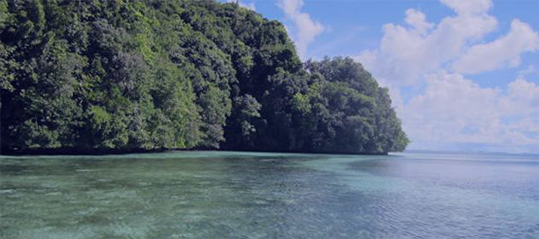
Indigo Seafood was founded by James C. Sanderson, MD and James P. McVey, PhD in 2006, as the best way for each to realize their dreams of developing the offshore aquaculture industry using submersible cage technologies developed by the National Oceanic and Atmospheric Administration (NOAA) over the past 25 years. We spent several years considering different potential locations, including sites in the Caribbean, Central and South America, North America and the Hawaiian Islands. There are many specific requirements for the development of such an operation. Environmental, political, social and logistical factors all play a role in choosing an appropriate site for the business.
The founders decided upon Republic of Palau (Palau) as the absolute best location for a variety of reasons. James McVey has a long history in Palau, having worked there for 7 years as the Chief Biologist for the Trust Territories in the 1970’s. This familiarity and subsequent political and social connections have facilitated Indigo’s entry into the Palau business scene. Palau has modern infrastructure and shipping capabilities for construction, communication, importation of supplies and exportation of product. In addition, the citizens are familiar with and advocates of aquaculture as an industry.
This project envisions marine aquaculture as a significant opportunity to create jobs and exports for the Republic of Palau. Indigo Seafood was formed to take advantage of new marine aquaculture technology that allows aquaculture to be conducted in open ocean conditions.
Management Team – Indigo has assembled a dynamic team of individuals with the background, experience and knowledge to execute this business plan and take the company to profitability. The team has strength in the key areas of scientific experience, business management expertise, and offshore facility logistics. With over 75 years combined experience in Aquaculture and 100 years in Marine Biology, they have the practical experience necessary to negotiate unforeseen circumstances. The most distinct advantage Indigo enjoys is its management team. These individuals represent some of the few with the relationships, experience and familiarity with the technology required to consider this venture. Along with this history in the industry, the connection to the key players in this industry on a global scale is unmatched.
Technology – From the experience of the management team, we have an understanding of which technologies to choose in the areas of hatchery, grow-out, feed supply, harvesting, and product delivery. Having been advocates and participants during development of many of the recent technological advances in the industry allows access to both the successes and failures of past ideas.
Product Quality – Indigo has chosen only highly valuable species to produce and will also further add value, and subsequently price, by producing certified, sustainable fish. When Organic standards are officially endorsed for seafood, Indigo will be well positioned to adopt them. All of this quality control translates not only to safety, but especially to taste. Indigo’s products will be known as the best tasting, freshest, and healthiest fish available. Indigo will implement supply chain traceability, documenting the entire history of feed sources, including testing history of the feeds and products.
Sustainability – One of the key elements to Indigo’s uniqueness as a company and what will be a primary facilitator of success is the approach to resource management. Farm raised fish receive a diet with varying amounts of fish protein in the pellets. It is this protein that not only makes the diet attractive to the fish, but also gives it the nutritional value that is desirable. The source of the protein for almost all farmed fish is fishmeal, made from commodity forage fish. Even though a fish can already be farmed with half the amount of fishmeal that would be consumed by a wild-caught fish, Indigo plans on reducing this amount even further. By using alternative sources of protein in its feeds, including soy and other agricultural grains, Indigo can further improve sustainability. Few aquaculture companies are reducing the consumption of forage fish in this manner.
Local Community – Indigo understands the value of the support from the local community and will continue to maintain the proper cultural respect and encourage participation. Indigo will be engaging several different communities in the direct management and work on the offshore operations. It is vital that the people of Palau see and share the benefit of the company’s success.